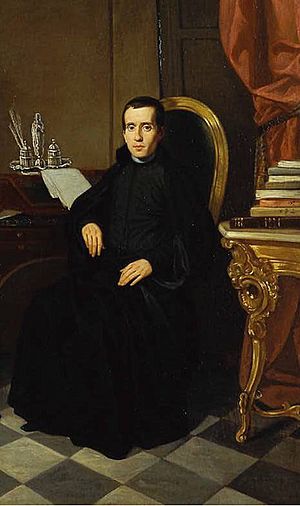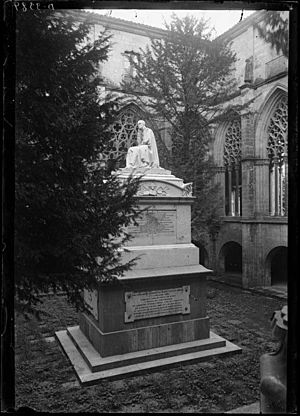Jaime Balmes facts for kids
Quick facts for kids
Jaime Balmes
|
|
|---|---|
 |
|
| Born |
Jaime Luciano Antonio Balmes y Urpiá
August 28, 1810 |
| Died | July 9, 1848 (age 37) Vic, Catalonia, Spain
|
| Nationality | Spanish |
| Alma mater | University of Cervera |
| Era | 19th-century philosophy |
| Region | Western philosophy
|
| School | Catholic philosophy |
|
Main interests
|
|
|
Influenced
|
|
Jaime Luciano Balmes y Urpiá (born August 28, 1810 – died July 9, 1848) was an important Spanish thinker. He was a philosopher, a theologian (someone who studies religion), and a writer. He also wrote about politics and society. Balmes was known for defending the Catholic faith. He was called the Prince of Modern Apologetics by Pius XII. This means he was a leading figure in explaining and defending religious beliefs in modern times.
Contents
Life of Jaime Balmes
Balmes was born in a town called Vic in Catalonia, Spain. He was baptized on the same day in the city's cathedral. He also passed away in Vic.
Early Education and Studies
In 1817, Balmes started his studies at the seminary in Vic. A seminary is a school for training priests. He studied Latin grammar and rhetoric (the art of speaking and writing well). From 1822, he began studying philosophy. In 1825, he received the tonsure in Solsona. This was a step toward becoming a priest.
From 1825 to 1826, Balmes continued his theology studies in Vic. He then received a scholarship to study theology at the University of Cervera. In 1830, the university closed for a while. Balmes continued his studies on his own in Vic. On June 8, 1833, he earned his degree in theology.
Becoming a Priest and Professor
On September 20, 1834, Balmes became a priest in Vic. He kept studying theology and church laws at the University of Cervera. In 1835, he earned his Doctor of Theology degree. He also got a Bachelor's degree in church law.
Balmes tried to get a teaching job at the University of Barcelona. He didn't succeed right away. For some time, he worked as a tutor in Vic. In 1837, the City Council hired him as a Professor of Mathematics. He held this job for four years. In 1839, his mother, Teresa Urpiá, passed away. In 1841, he moved to Barcelona.
Writing and Influence
After moving to Barcelona, Balmes became a very active writer. He wrote for different newspapers and magazines. These included Peace, Catholic Madrid, and Civilization. His writings quickly gained attention.
From 1841, his ideas became very popular. He wrote many important works that were admired across Europe. One of his famous writings was about the idea of value. He asked, "Why is a precious stone worth more than a piece of bread?" He explained this using the idea of "marginal use." This means how much something is valued based on how much extra satisfaction it gives you.
Balmes was exiled for a time after criticizing a political leader named Espartero. When he returned, he started a weekly newspaper called El Pensamiento de la Nación. This newspaper shared Catholic and conservative views.
His most famous book is El Protestantismo comparado con el Catolicismo en sus relaciones con la Civilización Europea. The title means "Protestantism and Catholicity compared in their Effects on the Civilization of Europe." In this book, Balmes argued that Catholicism promoted order and obedience. He said Protestantism led to revolt or disorder. This book was a strong defense of Catholicism. It was often used to argue against ideas that said Protestant thought was key to modern society.
His best philosophical works were Filosofia Fundamental (Basic Philosophy) and Curso de Filosofia Elemental (A Course of Elementary Philosophy). He even translated the second book into Latin for use in seminaries. Balmes also supported the idea of a monarchy, which is a system of government with a king or queen.
Jaime Balmes passed away from tuberculosis in Vic in 1848. He was only 37 years old.
Balmes's Ideas
Many people think Balmes's philosophy is just about "common sense." But it's much more detailed than that. In his books, Fundamental Philosophy and Elementary Philosophy, he explored the idea of certainty. Certainty is about knowing something is true without a doubt.
Balmes believed there are three main types of truth:
- Subjective truths: These depend on a person's feelings or perceptions. For example, saying "I am cold" is a subjective truth. It's real for you, but others might not feel it.
- Rational truths: These are logical and mathematical truths. For example, 2 + 2 = 4 is a rational truth.
- Objective truths: These are things that are true for everyone, but not just because of logic. For example, "the sky is blue" is an objective truth.
Balmes argued that you can't doubt everything. He said that even when you doubt, you are certain that you are doubting. So, doubt itself is a kind of certainty. He believed that true doubt about everything is impossible.
How We Know Things Are True
Balmes said that certainty is natural, like doubt. It comes before philosophy. To reach certainty, we need "criteria," which are ways to find the truth. He divided these criteria into three types:
- Consciousness: This is what you feel and think inside yourself. It's your inner experience. For example, when you feel a sensation, your consciousness experiences it. Balmes believed that consciousness itself cannot be wrong about what it experiences. It's a very personal and direct way of knowing. He thought animals also have consciousness, but humans have "reflex consciousness." This means we can think about our own thoughts and feelings.
- Evidence: This is about universal and logical truths. Unlike consciousness, which is personal, evidence applies to everyone. Balmes said there are two types of evidence:
* Immediate evidence: This doesn't need proof. For example, knowing that every object is equal to itself. * Mediate evidence: This requires proof or demonstration. Evidence helps us understand relationships between ideas.
- Intellectual Instinct (Common Sense): This helps us connect ideas with reality. It's not like an animal instinct. It's a rational instinct that helps us know that what we see really exists. For example, through this instinct, we know that trees are in a forest. This "common sense" helps us understand truths without needing to prove them. It also helps us understand probabilities, like the chances of winning the lottery.
Balmes believed these three criteria – consciousness, evidence, and intellectual instinct – are the main supports for understanding reality. He argued that no single idea can explain everything. Instead, different types of truths require different ways of knowing them.
Works by Jaime Balmes
Here are some of the important books and writings by Jaime Balmes:
- La Religión Demostrada al Alcance de los Niños, (Religion Explained for Children) 1847.
- Consideraciones Políticas sobre la Situación de España, (Political Considerations on the Situation of Spain) 1840.
- El Protestantismo Comparado con el Catolicismo en sus Relaciones con la Civilización Europea, (Protestantism and Catholicity Compared in their Effects on the Civilization of Europe) 1842–1845.
- El Criterio, (The Criterion) 1845.
- Curso de Filosofía Elemental, (A Course of Elementary Philosophy) 1847.
- Filosofía Fundamental, (Fundamental Philosophy) 1852.
Works in English Translation
Some of Balmes's works have been translated into English:
- European Civilization: Protestantism and Catholicity Compared in their Effects on the Civilization of Europe, 1850.
- Fundamental Philosophy, 1858.
- Letters to a Sceptic on Religious Matters, 1875.
- Elements of Logic, 1876.
See also
 In Spanish: Jaime Balmes para niños
In Spanish: Jaime Balmes para niños
- Carrer de Balmes
 | John T. Biggers |
 | Thomas Blackshear |
 | Mark Bradford |
 | Beverly Buchanan |


